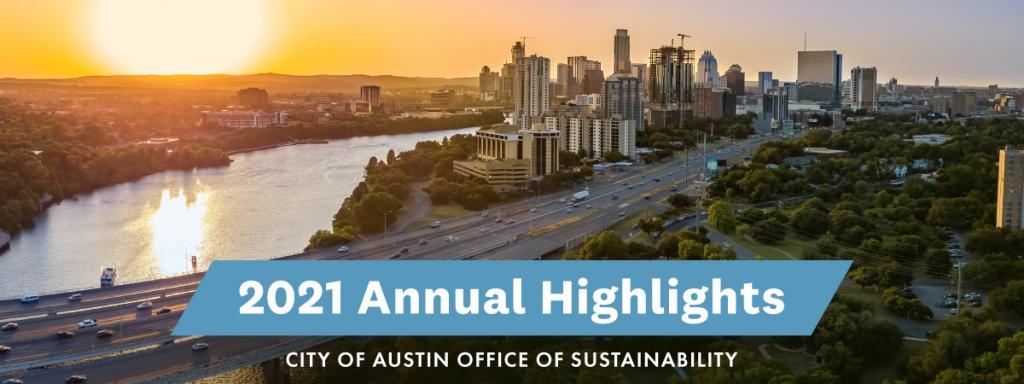Office of Sustainability: 2021 Annual Highlights

Top 7 Achievements
 |
Led the creation and final City Council adoption of the Austin Climate Equity Plan through a unique community-driven process that moves up our community-wide net-zero goal from 2050 to 2040. The plan includes 17 new goals and 74 strategies to achieve them. |
 |
Assisted with emergency response efforts by leading citywide food access during COVID-19 and Winter Storm Uri, including coordinating 75 partner organizations and distributing 170,000 meals to community members impacted by the storm. |
 |
Launched the first Food Justice Mini Grant program, which provided grant funds to 20 local organizations leading transformational change on food justice issues in our community. |
 |
Led the creation of a partnership with Austin ISD and Travis County to create a network of Resilience Hubs to increase community resilience using $3M of council-approved funding. |
 |
Led the City's participation in the Capital Area Council of Governments' addendum to the regional air quality plan. Facilitated City Council commitment to fine particulate matter emissions reduction measures, community awareness, and education. |
 |
Awarded Bright Green Future Grants to 41 area schools for sustainability-focused projects and education. Almost half of the grant recipients qualify for Title 1 funding, which includes schools with higher numbers of students from low-income families. |
 |
Helped launch a partnership with Travis Audubon, Texan by Nature, and others to spread awareness about "Lights Out for the Birds," which encourages residents and businesses to turn off lights at night to reduce bird fatalities. |
Top Stories
%20(3).gif) A New Climate Plan for Austin
A New Climate Plan for Austin-
It has become clear that the Earth's climate is changing faster than anticipated, the impacts are serious, and we are not reducing emissions quickly enough. Climate scientists warn that to avoid the worst impacts of climate change and preserve a livable climate, we must reduce emissions drastically. We also know that climate solutions can improve everyone's quality of life, but the impacts of climate change don't affect everyone equally.
In September 2021, City Council adopted the Austin Climate Equity Plan. The plan advances the work of the previous 2015 Community Climate Plan and further centers equity throughout its 17 new goals and 74 strategies. It also includes the bold and aggressive goal of equitably reaching net-zero community-wide greenhouse gas emissions by 2040 with a strong emphasis on cutting emissions by 2030. Getting to net-zero means the Austin community would reduce our use of fossil fuels to nearly zero.
This new plan resulted from hundreds of hours of work with input from nearly 200 community members with an intentional focus on engaging racially and economically diverse residents about the challenges, barriers, and opportunities facing historically excluded groups. Community Climate Ambassadors were mobilized to engage members of our community on climate-related topics and provide feedback on potential strategies. Each strategy in the plan was evaluated through an equity tool that accounted for outcomes related to health, affordability, accessibility, community capacity, cultural preservation, accountability, and a just transition to green jobs.
Clear and specific actions are required to move us toward our 2040 net-zero goal. The Austin Climate Equity Plan sets goals across five focus areas: Sustainable Buildings, Transportation and Land Use, Transportation Electrification, Food and Product Consumption, and Natural Systems. In addition, it sets broad goals related to green jobs and prioritizes local community initiatives.
To learn more about the Climate Equity Plan's focus areas and goals, visit our website.
-
%20(2).gif) Building Food Justice
Building Food Justice -
For Austin to be a thriving, equitable, and ecologically resilient community, we must have a food system that works for everyone. To achieve this vision, the Office of Sustainability launched a new Food Justice Mini Grant program. The program seeks to provide flexible funding of up to $3,000 to organizations supporting those in our community most negatively impacted by food-related injustice.
The 20 organizations chosen as grant recipients are leading transformational change in our communities. Whether creating paid opportunities for underrepresented communities to engage in edible education or hosting gardening workshops by and for people of color, the Food Justice Mini Grant recipients are working to improve healthy food access and address the structural inequities that lead to disparate health and economic outcomes.
"Food Justice means getting nutritious food shouldn't be a privilege," said Matt Simon, Farm Director for the Multicultural Refugee Coalition's New Leaf Agriculture Program. Through the Food Justice Mini Grant, the Multicultural Refugee Coalition was able to expand access to fresh, organic produce to refugee families in Austin.
15% of Central Texans are currently food insecure, and less than 1% of food consumed in Austin is produced locally. In 2021, food insecurity was amplified by the dual crises of the COVID-19 pandemic and Winter Storm Uri. To work towards food justice, we must:
- Carefully consider how our food is produced, sold, and consumed
- Explore how food customs are valued
- Ensure food-production workers are treated fairly and well-compensated
- Understand and right the structural inequities that continue to negatively and disproportionally impact low-income communities and communities of color
We appreciate the work of the Food Justice Mini Grant recipients for leading this charge across Austin.
For more information about the City's food-related programs, visit austintexas.gov/food.


